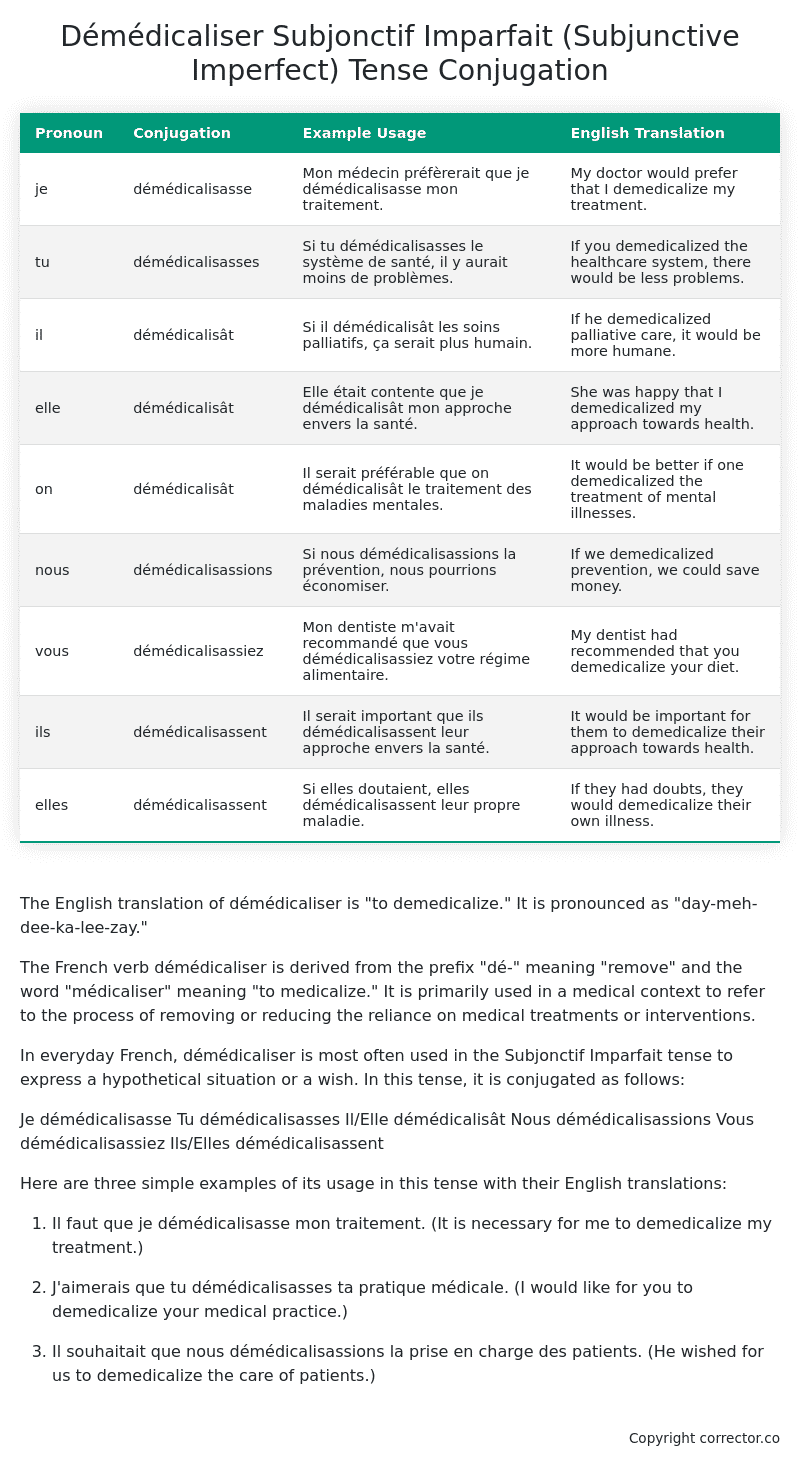Subjonctif Imparfait (Subjunctive Imperfect) Tense Conjugation of the French Verb démédicaliser
Introduction to the verb démédicaliser
The English translation of démédicaliser is “to demedicalize.” It is pronounced as “day-meh-dee-ka-lee-zay.”
The French verb démédicaliser is derived from the prefix “dé-” meaning “remove” and the word “médicaliser” meaning “to medicalize.” It is primarily used in a medical context to refer to the process of removing or reducing the reliance on medical treatments or interventions.
In everyday French, démédicaliser is most often used in the Subjonctif Imparfait tense to express a hypothetical situation or a wish. In this tense, it is conjugated as follows:
Je démédicalisasse
Tu démédicalisasses
Il/Elle démédicalisât
Nous démédicalisassions
Vous démédicalisassiez
Ils/Elles démédicalisassent
Here are three simple examples of its usage in this tense with their English translations:
-
Il faut que je démédicalisasse mon traitement.
(It is necessary for me to demedicalize my treatment.) -
J’aimerais que tu démédicalisasses ta pratique médicale.
(I would like for you to demedicalize your medical practice.) -
Il souhaitait que nous démédicalisassions la prise en charge des patients.
(He wished for us to demedicalize the care of patients.)
Table of the Subjonctif Imparfait (Subjunctive Imperfect) Tense Conjugation of démédicaliser
| Pronoun | Conjugation | Example Usage | English Translation |
|---|---|---|---|
| je | démédicalisasse | Mon médecin préfèrerait que je démédicalisasse mon traitement. | My doctor would prefer that I demedicalize my treatment. |
| tu | démédicalisasses | Si tu démédicalisasses le système de santé, il y aurait moins de problèmes. | If you demedicalized the healthcare system, there would be less problems. |
| il | démédicalisât | Si il démédicalisât les soins palliatifs, ça serait plus humain. | If he demedicalized palliative care, it would be more humane. |
| elle | démédicalisât | Elle était contente que je démédicalisât mon approche envers la santé. | She was happy that I demedicalized my approach towards health. |
| on | démédicalisât | Il serait préférable que on démédicalisât le traitement des maladies mentales. | It would be better if one demedicalized the treatment of mental illnesses. |
| nous | démédicalisassions | Si nous démédicalisassions la prévention, nous pourrions économiser. | If we demedicalized prevention, we could save money. |
| vous | démédicalisassiez | Mon dentiste m’avait recommandé que vous démédicalisassiez votre régime alimentaire. | My dentist had recommended that you demedicalize your diet. |
| ils | démédicalisassent | Il serait important que ils démédicalisassent leur approche envers la santé. | It would be important for them to demedicalize their approach towards health. |
| elles | démédicalisassent | Si elles doutaient, elles démédicalisassent leur propre maladie. | If they had doubts, they would demedicalize their own illness. |
Other Conjugations for Démédicaliser.
Le Present (Present Tense) Conjugation of the French Verb démédicaliser
Imparfait (Imperfect) Tense Conjugation of the French Verb démédicaliser
Passé Simple (Simple Past) Tense Conjugation of the French Verb démédicaliser
Passé Composé (Present Perfect) Tense Conjugation of the French Verb démédicaliser
Futur Simple (Simple Future) Tense Conjugation of the French Verb démédicaliser
Futur Proche (Near Future) Tense Conjugation of the French Verb démédicaliser
Plus-que-parfait (Pluperfect) Tense Conjugation of the French Verb démédicaliser
Passé Antérieur (Past Anterior) Tense Conjugation of the French Verb démédicaliser
Futur Antérieur (Future Anterior) Tense Conjugation of the French Verb démédicaliser
Subjonctif Présent (Subjunctive Present) Tense Conjugation of the French Verb démédicaliser
Subjonctif Passé (Subjunctive Past) Tense Conjugation of the French Verb démédicaliser
Subjonctif Imparfait (Subjunctive Imperfect) Tense Conjugation of the French Verb démédicaliser (this article)
Conditionnel Présent (Conditional Present) Tense Conjugation of the French Verb démédicaliser
Conditionnel Passé (Conditional Past) Tense Conjugation of the French Verb démédicaliser
L’impératif Présent (Imperative Present) Tense Conjugation of the French Verb démédicaliser
L’infinitif Présent (Infinitive Present) Tense Conjugation of the French Verb démédicaliser
Struggling with French verbs or the language in general? Why not use our free French Grammar Checker – no registration required!
Get a FREE Download Study Sheet of this Conjugation 🔥
Simply right click the image below, click “save image” and get your free reference for the démédicaliser Subjonctif Imparfait tense conjugation!

Démédicaliser – About the French Subjonctif Imparfait (Subjunctive Imperfect) Tense
Formation
Common Everyday Usage Patterns
Interactions with Other Tenses
Subjonctif Présent
Indicatif Passé Composé
Conditional
Conditional Perfect
Summary
I hope you enjoyed this article on the verb démédicaliser. Still in a learning mood? Check out another TOTALLY random French verb conjugation!


